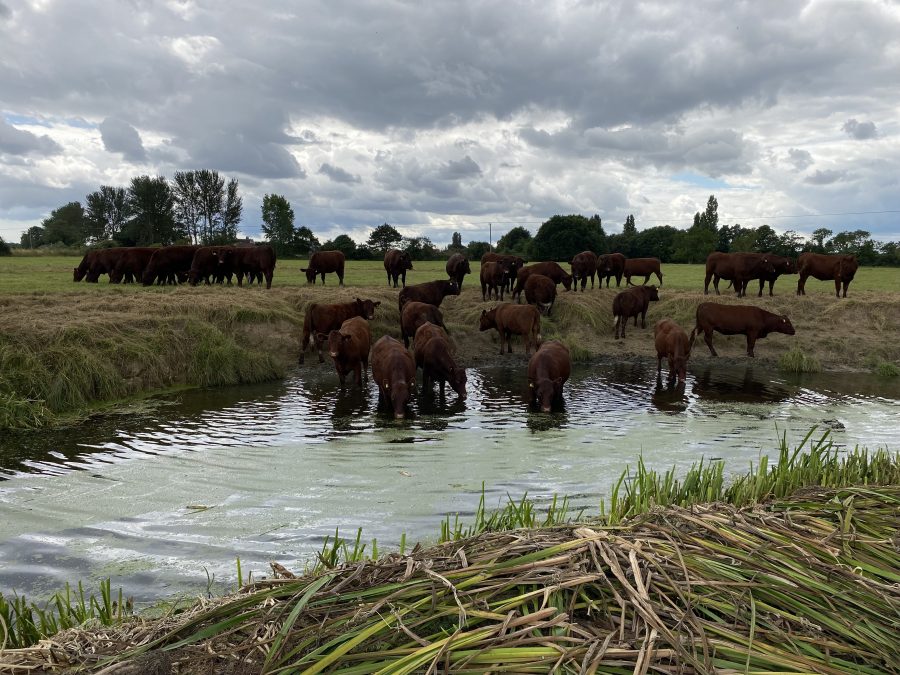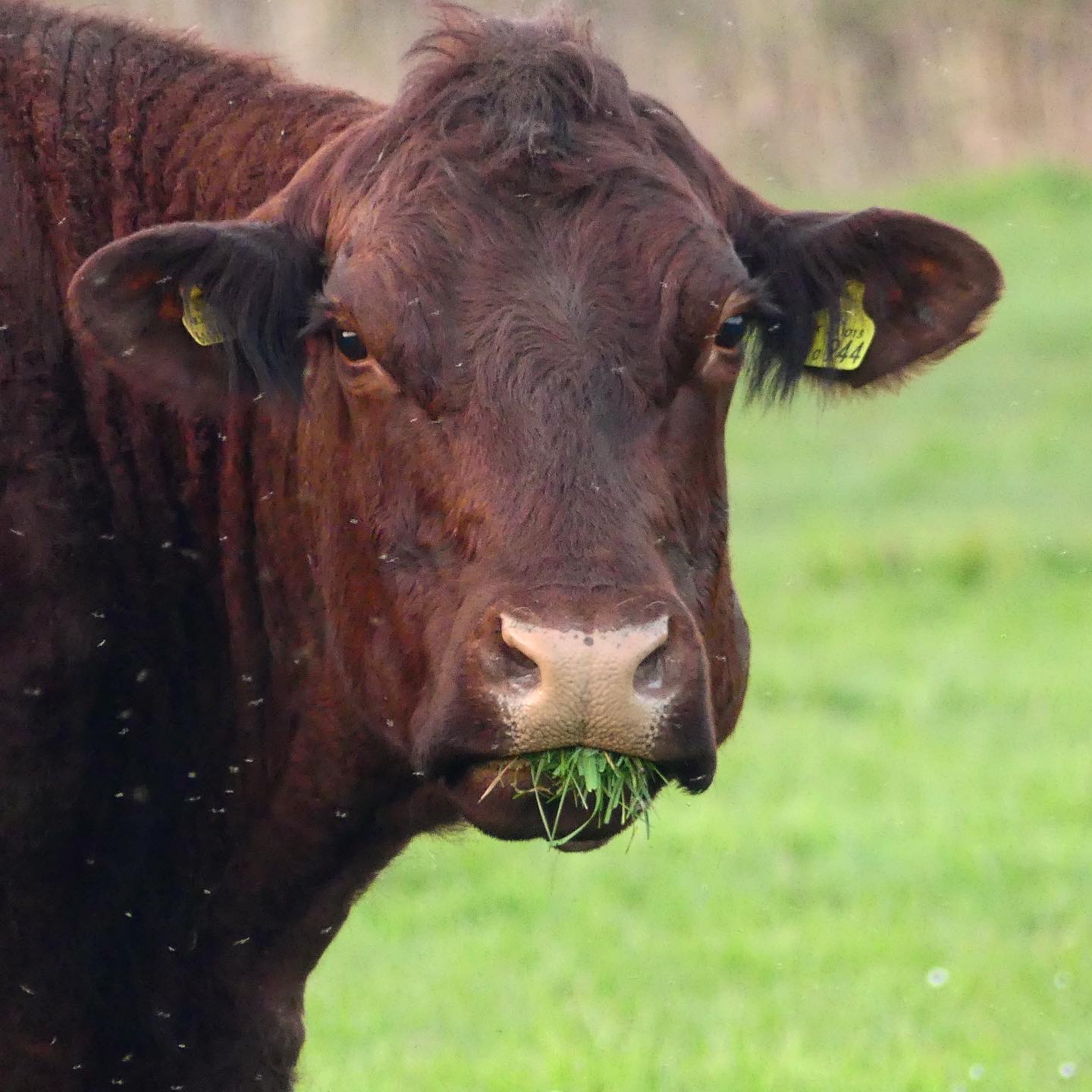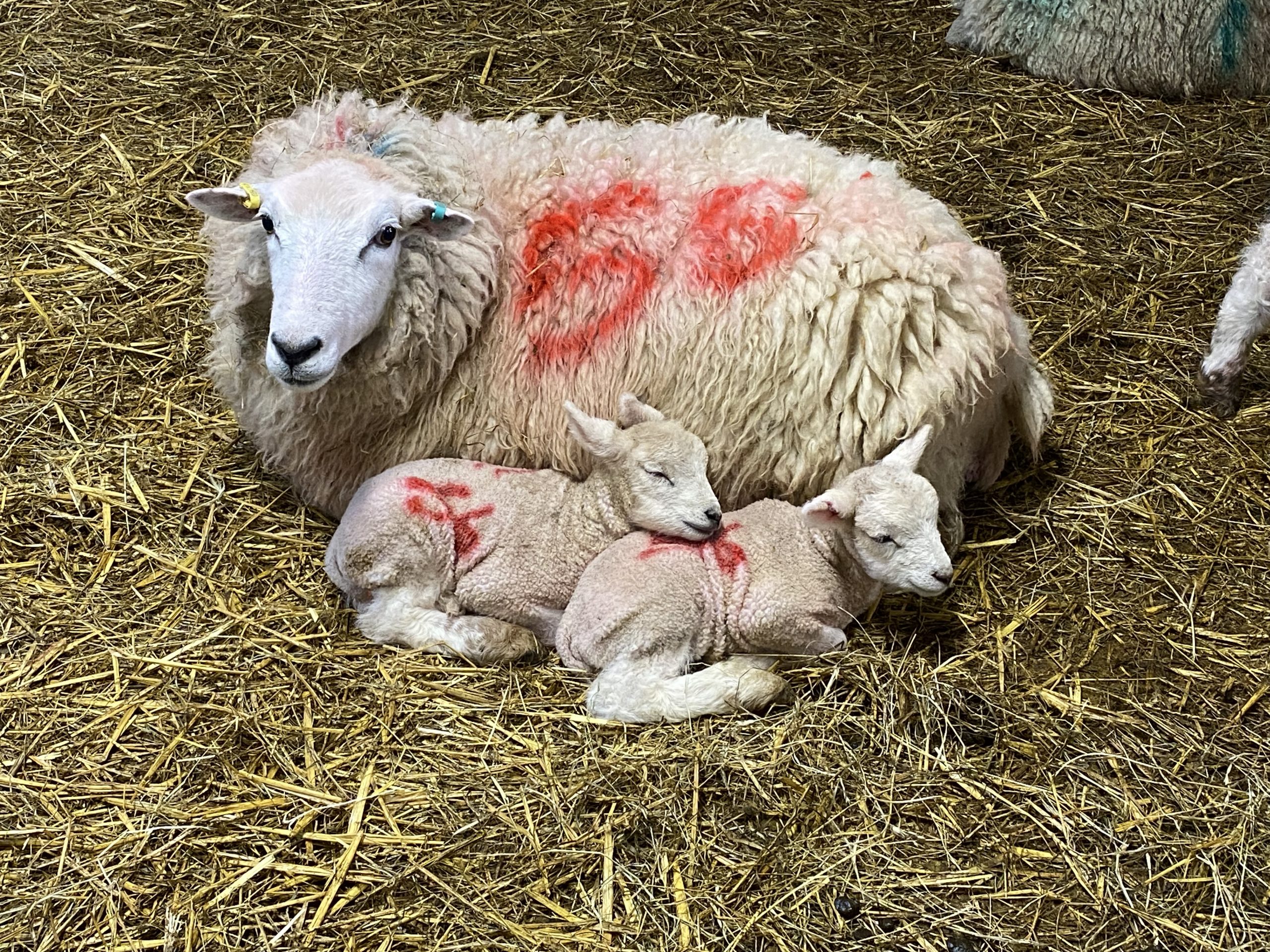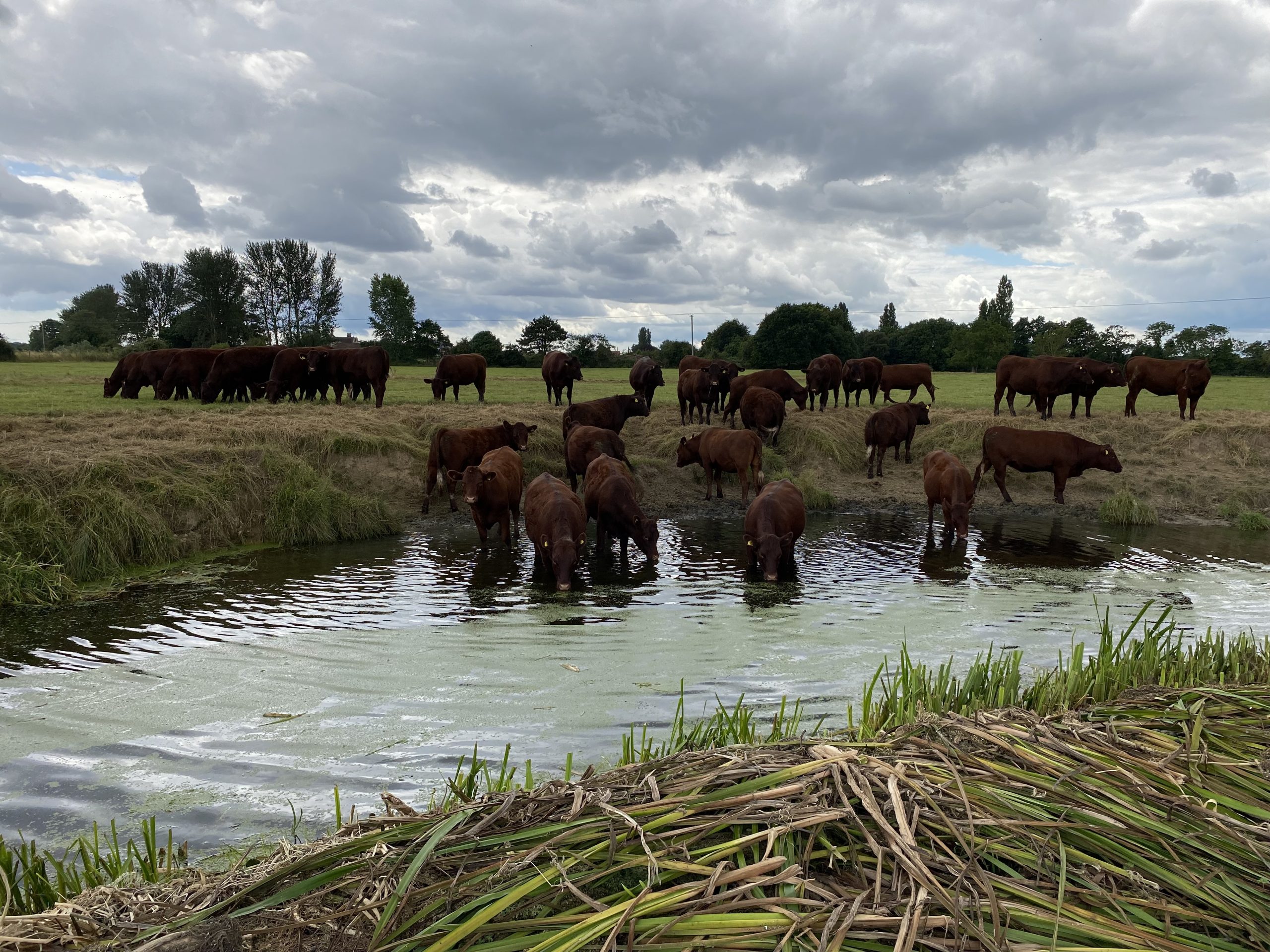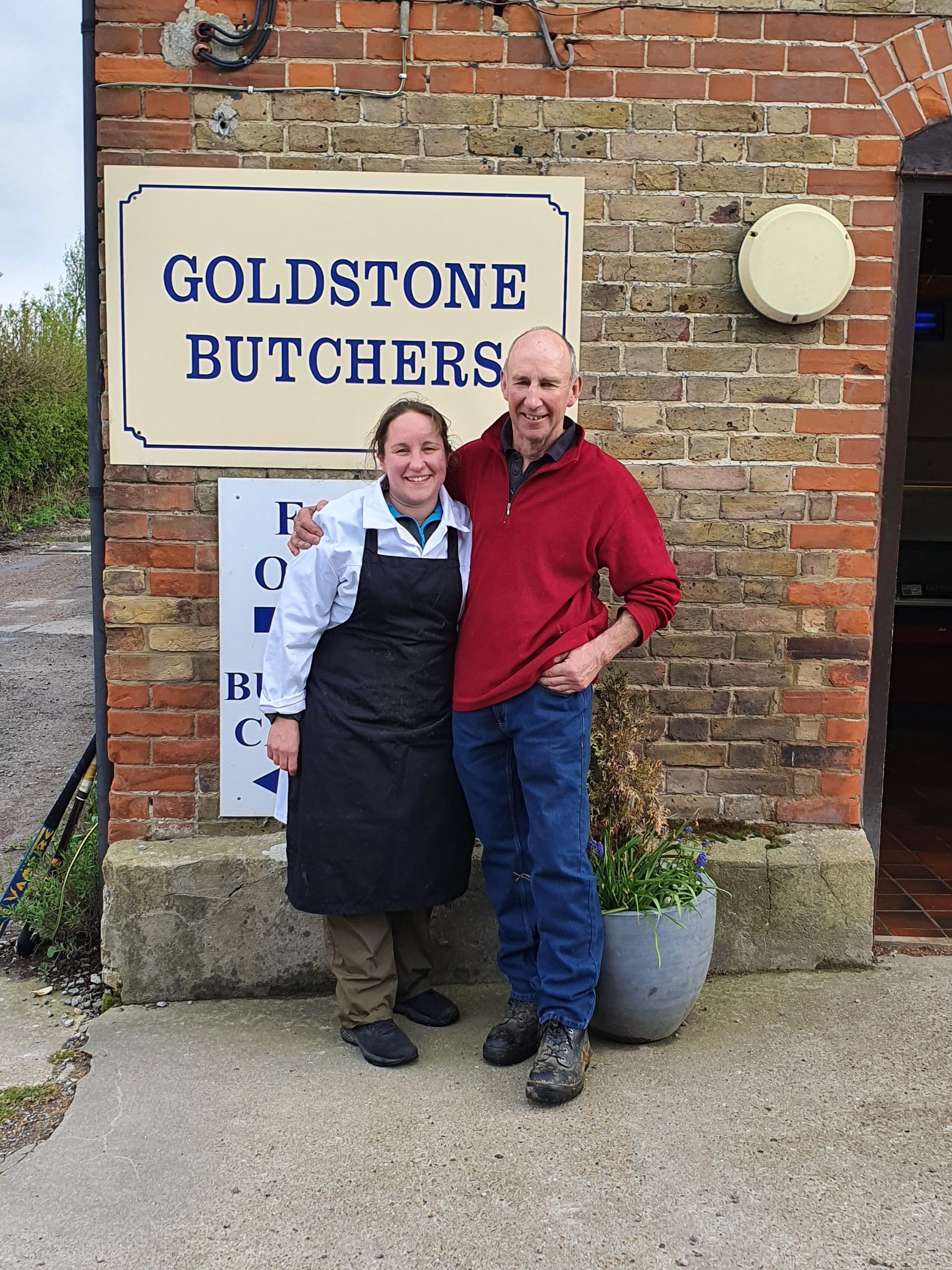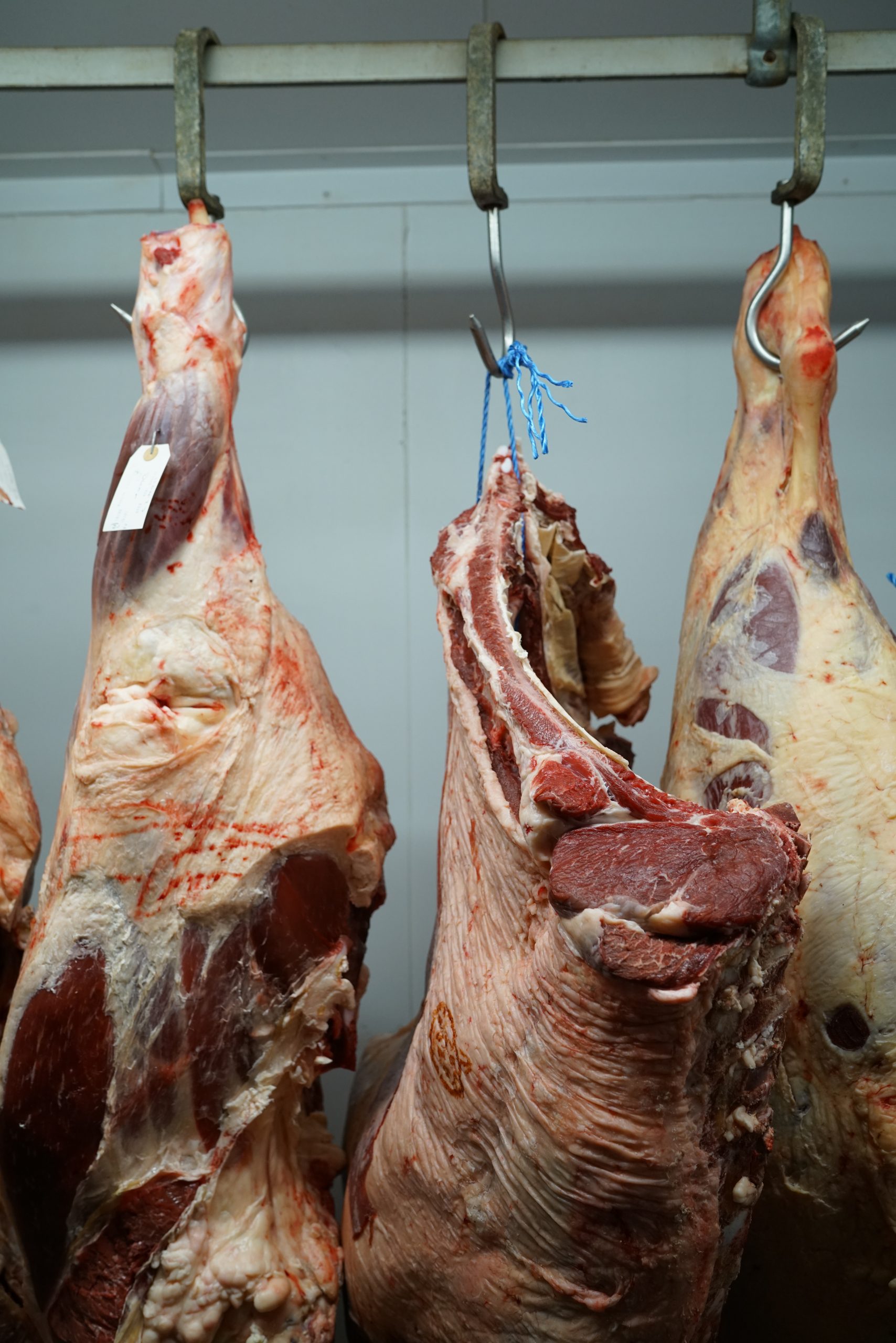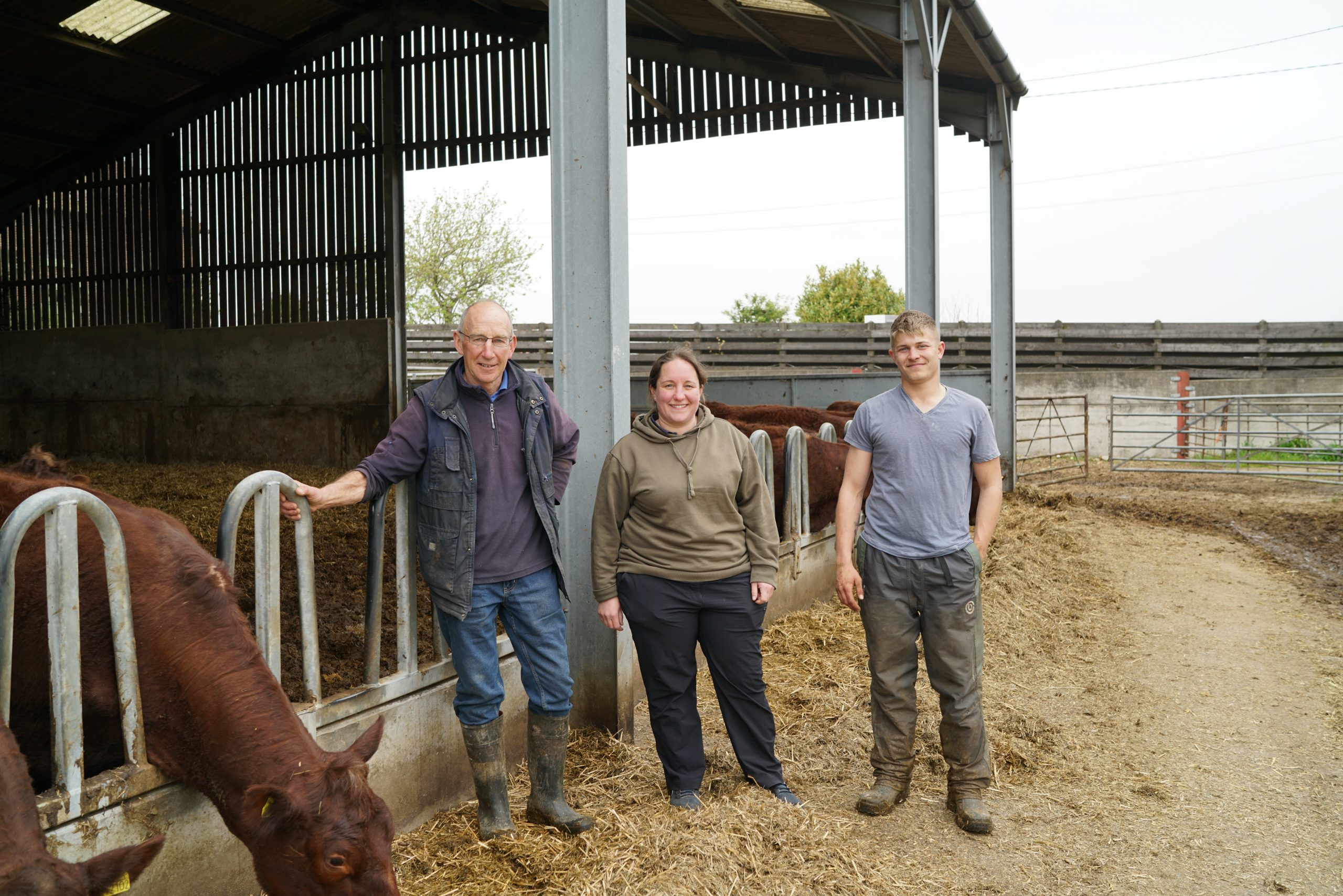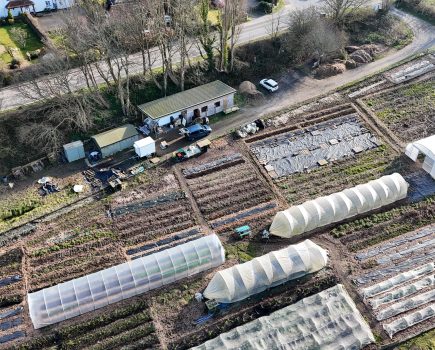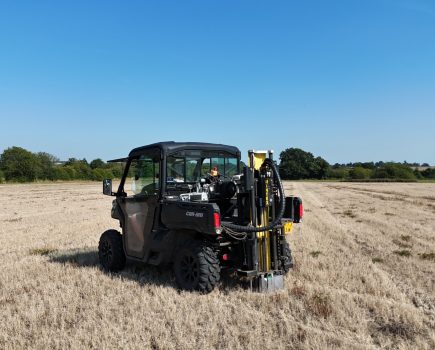This month Nigel Akehurst visits Chandler & Dunn Ltd, a large, mixed family-run business that farms just over 600 hectares on two farms in east Kent split across three main enterprises of top fruit, arable and grass for livestock. Nigel met two family members from the livestock team and one from the fruit team to find out more about their business and the newly-acquired Sausage Shop in Sandwich.
The origins of the business can be traced back five generations to 1809, when Peter Chandler bought 28 acres at Lower Goldstone, Ash, in Kent. Today’s business began as a partnership after George Dunn married Winifred Chandler in 1922 and the limited company was established in 1954. The seven working directors are the seventh and eighth generations of the family to farm here.
Arriving down a small country lane past several orchards and a large farmyard, I arrive at the farm butchery (Goldstone Butchers) and farm offices, where I meet father and daughter Roger and Alice Dunn, two of the seven family directors.
Roger heads up the livestock enterprise which is run on about 200 hectares of marshland on the Ash Levels, all of which is in environmental schemes.
He took over from his father John, who registered the first pedigree Sussex on the farm in 1942 as the Goldstone Herd. Roger has continued what his father started, breeding polled Sussex for today’s market, and has built up one of the largest herds in the UK, with 155 cows. This prize-winning herd supplies animals to the butchery enterprise as well supplying bulls, heifers and cows to other livestock farmers.
The business also runs a flock of 600 Romney ewes, some of which are crossed with Charolais to produce fat lambs, the majority of which are sold through the butcher’s shop. For many years the flock was lambed in April as the marshland grass can be slower to get going in the spring. With the addition of the butchery, it was decided to lamb 200 ewes at the beginning of March and the rest as usual in April, giving a steady supply of lamb to the butchery.
Butchery business
Following BSE and foot and mouth, both of which put considerable pressure on the livestock enterprise, the company decided to try selling direct as livestock prices were under considerable pressure. There was also a demand for locally produced food with a known traceability. Selling meat packs to friends and family proved a success, so they purchased a specialist butchery portacabin in 2000.
Fortuitously, at the same time a small family abattoir was opened six miles away by J R Farm Meats. Today the carcasses are brought back to the shop, where the beef is hung for 21 days before being butchered, keeping the whole process local.
Over the years the demand has grown and they now butcher and sell two bodies of beef and at least 10 lambs a week through the shop. Alongside the traditional cuts of beef and lamb, the butchery also sells homemade pies and uses locally sourced pork to make sausages.
Daughter Alice joined the business in 2000 on a gap year after school just as the butchery was building up and decided the business gave her an exciting future. Twenty-three years later it is still providing new challenges with a new retail outlet.
In 2004 the business moved out of the specialist butchery portacabin into a converted granary with a sales area, cutting area and a large walk-in fridge. Being “off the beaten track” they rely mainly on loyal customers who value traceability and local production, Alice explained.
The butchery also offers a click and collect service via their website which allows customers to collect from the butchery on the farm or the recently acquired Sausage Shop in Sandwich.
Sandwich Sausage Shop
When the owner of the Sausage Shop in nearby Sandwich, Les Kinnear, decided to retire in March, Chandler & Dunn jumped at the chance to take it on. Having supported a weekly farmers’ market in the historic town, it made sense to expand their retail offering and it allows them to tap into the passing trade they don’t get at the farm butchery. They officially reopened for the Easter weekend and have been thrilled with the support in their first weeks of trading, said Alice.
Sussex Breed
The Sussex breed is well suited to the extensive rearing system and land types Chandler & Dunn use for the livestock enterprise. Eager to learn more about their Sussex herd, I asked Roger what age they finished their cattle.
“Over the years we have come to realise that the ideal age for us to finish is around 20 months,” said Roger. Typical carcass deadweights are around 330kg to 350kg, added Alice.
To do this they bring them inside for their final 90 days, feeding them a diet of home-produced silage and a mix of barley, wheat and beans (also home produced) which is ground onsite by a specialist milling wagon. They also feed brewers’ grains from several local breweries and waste apples and potatoes when available.
At the time of visiting, the cows were still in yards due to recent wet weather. Turning out too soon could result in poaching of the heavy marshland soils. He hoped to get them out as soon as conditions allowed, said Roger, who was in the process of moving some of their cows back to the main farm to PD the following day.
Once out on grass they split the cows into three or four bulling groups. They calve twice a year, 90 in the autumn and 60 in the spring. When showing me a group of his spring calvers, he stopped to give one of his favorites a back scratch. “They are lovely cows to work with and easy calving,” he said, though he admitted they do have a challenging calving every so often.
Both Roger and his stockman Chris Reed take animals to agricultural shows in the South East, where over the years they have been successful. This success has helped the sales of breeding stock; most years Roger will sell between 10 and 15 breeding heifers privately, along with some prized bulls.
A key driver behind the growing popularity of the breed is its ability to do well on minimal forage. With the summers becoming increasingly dry in the South East, it’s a trait that is becoming more sought after, Roger said.
Romney Sheep
At the time of my visit, the team had nearly finished lambing their 600 Romney ewes. Lambing of 200 ewes starts in early March, with the remainder of the flock lambing in early April. Lambing percentages are around the 135% mark. Roger likes the Romney as it suits the marshland, but is tempted to try some easy care sheep in the future.
Most of the lambs are finished on a home-grown ration (they bring them inside for the last six weeks) and sold through the shop.
Fruit
Chandler & Dunn grows around 200 hectares of apples and has around 3,500 tonnes of specialist storage on site. Fruit is stored on the farm before being sent on to packers and on to supermarkets. They grow on two sites, Goldstone and Perry farms.
Fruit brings in most of the farm income but also accounts for a large share of its costs, said Richard Chandler, one of the family directors managing the fruit enterprise.
Chandler & Dunn specialises in growing top-tier dessert apples, he said. Varieties grown on site include Gala, Egremont Russet, Jazz and Braeburn, and the business is introducing new varieties such as Crimson Crisp, Daliclass, Smitten, Kissabel and Ladina. As many orchards as possible have trickle irrigation and the company has water abstraction licences for both farms.
The business is a member of Fruition Producer Organisation (a grower group) with fruit going to two large local packers which supply the majority of UK supermarkets. Having a range of outlets allows better crop use, with fruit not suitable for the fresh market normally sold for juice or fed to the cattle.
At the end of the picking season there is still some fruit left on the trees which is picked for a food charity called The Bread and Butter Thing. Last year approximately 30 tonnes was harvested for the charity, with the apples going to food banks.
Richard explained that as soon as the apple passes its optimum pick date it starts to take goodness from the trees. “If you leave the fruit on the tree, it ruins the return bud for the following year, so our options are either to pick them or shake the trees to get them off,” he said.
Cold storage and energy price rises
Last year the UK market was flooded with small fruit from Europe because Europeans don’t like small apples and we do, said Richard. As a result, the company still has a lot of apples in storage, which is expensive. Like many businesses they have faced huge increases in energy costs. The farm has invested significantly in solar panels and is installing more this year.
Richard said they hoped to sell all the crop by the end of June. Labour costs have also increased quite dramatically; they are finding it more difficult to source labour and are having to look further afield. A caravan site for the multi-national seasonal workforce has self-contained units.
Alongside Red Tractor and LEAF audits, the company has undertaken an independent ethical audit (GRASP) and is also audited by the labour provider that supplies most of the labour via the seasonal agricultural workers scheme.
Most orchard operations are carried out on a piecework basis which Richard said pickers preferred because the more they picked the more they were paid, though they still have to earn the minimum wage.
“We’ve all picked apples on the management side and we know what is achievable and what isn’t. We would expect a competent picker to be able to produce four bins of fruit a day. A really good picker can pick a bin in an hour. We have to make sure the slowest picker earns his or her basic minimum rate,” he said.
“Apple picking is not for everybody – they are carrying a picking bag of apples all day long. It’s tiring work and some people find they just can’t do it. We train them as much as possible but sometimes it doesn’t work out,” he added. Quality is of paramount importance and they try to encourage back people who have worked with them before.
It’s easy to bruise apples and so there is good supervision and roving quality control within the orchard to ensure good quality in the bin. With good quality crucial to the success of the business, the company is continually looking at ways to improve the picking operation.
Are robot pickers the future? I asked Richard. He thinks they are still some way off, simply because the robots he’s seen work on a suction process and don’t have the dexterity of a human hand (which is able to twist and lift the apple).
The next logical step, he thinks, are moving platforms, already being used by some growers, which enable small teams of pickers to pick directly onto conveyor belts. “At present these machines are still too expensive to be economically viable for them,” he said.
With annual food inflation running at around 10%, I was interested to learn that the price of apples in the UK only went up 0.8%. Richard pointed to international growers in South Africa and South America “who are able to grow, harvest and ship their product half way around the world and still do it cheaper than we can because of their lower costs of production and our higher wages.”
With double digit inflation on many of their input costs, he thinks a lot of smaller growers will struggle to survive unless prices improve. As for their own operation, Richard couldn’t imagine doing anything else and said Chandler and Dunn were in business for the long haul and aimed to manage the peaks and troughs.
Arable and Environmental Schemes
The business has 214 hectares of arable land with a range of combinable crops including winter wheat, barley, oilseed rape, beans and linseed and 22 hectares of potatoes, with the remainder in environmental areas.
Most of the arable crops are grown on the tile-drained marshland, with the barley, beans and wheat stored on farm. The potatoes are grown on the upland brickearth and are irrigated with water from the Richborough Stream (the main drainage dyke on the Ash Levels).
Potatoes are stored, graded and packed on farm in 25kg bags and sold to local merchants. The grain is sold to a range of grain traders. The company is looking at the new Environmental Land Management scheme and already has quite an area in Countryside Stewardship.
Open Farm Sunday
Chandler & Dunn has been taking part in Open Farm Sunday, a national event which encourages people on to farms, since 2013. In their first year they estimated 100 people would come, but almost 600 arrived.
In their second year, they expected between 500 and 700 and just over 1,000 turned up. They now run the event every other year and in 2022 welcomed more than 1,200 people.
The company believes educating the consumer about production methods is important, and Chandler & Dunn allows the public to see top fruit, arable and livestock enterprises on one site.
Campsite
Before heading off, Alice shows me the other new enterprise, a campsite located next to the offices. They have planning permission for 30 tent pitches and five bell tents from 1 May to 1 October after successfully trialing the idea last year under the 28-day rule.
They had a lot of campers from the London area, mainly families who loved being away from the hustle and bustle, said Alice. One of their commercial tenants, who makes charcuterie in a converted building next to the campsite, ran a few supper clubs in a marquee, which proved popular.
To run the site this year they have partnered with a local family business, Nethergong Camping, which already operates a number of local campsites in the area.
Farming for the future
Opening the new campsite and taking on the sausage shop are just the latest in a long line of farm diversifications that have made Chandler & Dunn the successful family-run mixed farming business it is today. By focusing on quality, diversifying and farming for the long haul they aim to achieve the sustainability that is crucial for farming businesses in today’s tough economic climate. With the next generation taking on the reins, this is a family which really does live and breathe farming.
Farm Facts
- Strong brickearth on the upland with heavier soils on the marshland
- 155 pedigree suckler cows (430 head of cattle)
- Keep 25 to 30 replacements each year and sell 10 to 15 breeding heifers and a few bulls through private sales
- 100 finished cattle sold through the butchery annually
- Finished cattle average 330kg to 350kg deadweight
- 600 Romney ewes with a lambing percentage of around 135%
- Majority of lambs sold through the shop, with remainder sold via Ashford livestock market
- Open Farm Sunday every other year – last event 1,200 attendees
- Some properties originally used by regular staff now rented out as the number of full-time employees has reduced
- Farm campsite – operated 28 days last year and now has planning permission for a permanent site that will be operated by Nethergong camping
- LEAF, GRASP and Red Tractor Accredited
- Roger and Alice Dunn
For more like this, sign up for the FREE South East Farmer e-newsletter here and receive all the latest farming news, reviews and insight straight to your inbox.

